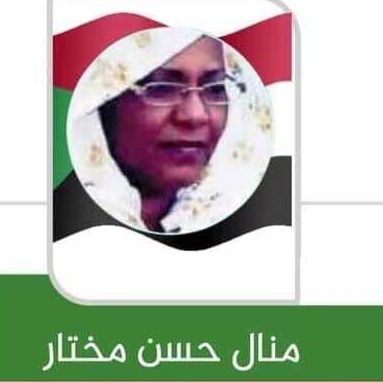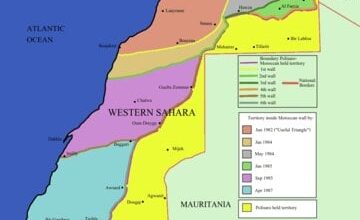Articles
Sudan, from the dark tunnel to darker globalization. By Dr. Manal Hassan Mukhtar June 11, 2024
By Dr. Manal Hassan Mukhtar Translated from Arabic by Ibrahim Ebeid

Sudan, from the dark tunnel to darker globalization.
By: Dr. Manal Hassan Mukhtar
June 11, 2024
The war that has been going on since April 15, 2023, is not absurd but rather deliberate. Still, it has gone out of the path of expectations to the repercussions due to the failure of initiatives and the quest to stop them at the national, local, and regional levels, which made international intervention to (solve) the dilemma expected. • We are all following the efforts of States at the regional level calling for an end to the war, but all of them have not achieved positive results because of stubbornness, rejection, and failure to respond to appeals, as well as the state of internal political incompatibility towards this crisis, which has made it a multipolar crisis that requires attention and calls for multiple concepts to find solutions, such as neutrality, Security Council resolutions, the capabilities of the international community, courts, legal sanctions, internationalization and others. • In the succession of this crisis since the coup of October 25 and the April 15 war, we find that it has gone through multiple stages and developments that may lead at the end to what is known as [internationalization] towards the Sudanese crisis due to the intransigence that is happening… • Internationalization in its general theoretical meaning in the concept of international relations is a process whereby a case file is placed on the table of several countries or international organizations in a political and diplomatic framework, and this is done by inviting a party from the international community to move to (solve) a problem or dilemma in a country and the reasons for seeking internationalization are due to the existence of a crisis or dilemma with multiple forms in terms of type, such as the Sudanese dilemma caused by the “15” April war. • The internationalization of the crisis is usually by the will of those who put it forward. Internationalization cannot be launched without a request, and this means that internationalization does not come on its own in that it is a complex process that needs efforts to meet interests and also needs mechanisms, methods, and designs to deal with obstacles resulting from the conflict of values with internationalization variables, as well as needs data and characteristics to separate the issues to be internationalized… • Internationalization is important in the process of facilitation through treatment and modification due to complexities; for example, the reality of the situation now in the current crisis due to the war falls in the circle of what is known as the [dark tunnel] – and the proof of this – is that all attempts to stop the war did not bring outputs for more than a year, but they did not advance a step towards developing a design for a national consensus even at the level of humanitarian need • What the war is doing in Sudan now is a dedication to seizing political power in light of the division and dispersion of political, national, and revolutionary visions, which will transfer this crisis, whether we like it or not, to the internationalization box because of this national impasse, in the sense of making the matter under international supervision and removing the management of Sudan from the (national authority) to the international circle, which is now paving the way for it because: . The failure of all national efforts to manage the war file. . The failure of all regional efforts [Jeddah platform, the African Union, IGAD, Bahrain, and Qatar, and the attempts of Egypt, Kenya, and South Sudan] to reach conclusions on stopping the war from a humanitarian standpoint… • These are sufficient reasons to transfer the Sudanese crisis from local and regional circles to the international circle, known as internationalization in the sense of making it an international issue that concerns the international community alone at the official governmental and popular civil level. • Depending on the general context of internationalization, it includes several aspects such as: • The international community bears political and legal responsibility in the State of Sudan, foremost of which is the cessation and end of the war, the return of displaced persons, and self-determination!!!!. • Making international resolutions to resolve any conflict in Sudan by what is known as international legitimacy, such as the decision to partition Sudan and establishing a political entity that serves a specific project!! • Adopting the international framework as a mechanism to deal with the issues of the Sudan. • Request for international protection for Sudan [squatting].!!!! • Internationalization controls must follow specific paths, such as freeing the issue from the grip of monopoly, whatever its region, type, or subject, so that the (great) powers monopolize the Sudanese cause with titles and slogans that touch reality but are far from being addressed by the people. Which may take a wonderful title, such as isolating the parties that caused the war, exposing their crimes, holding them accountable and prosecuting them, strengthening international support and support for the national right of the Sudanese people, on the Sudanese identity from a national perspective and a unitary vision, rejecting the principle of partition, defending the rights of the Sudanese people in resistance and national struggle under the rights guaranteed by international conventions and laws… Etcetera • If this is the reality of what Sudan has become and the future of what it will be, it is worse than the (frustrating) expectations and possibilities… If the matter is not remedied by the nobles of the homeland, the sons of its great history, and the witnesses of its painful present… Everyone will lose their most basic axioms and their greatest rights… Homeland and patriotism. Translated from Arabic by Ibrahim Ebeid




